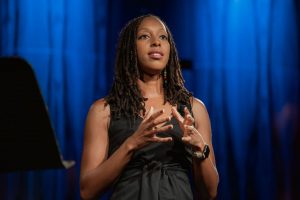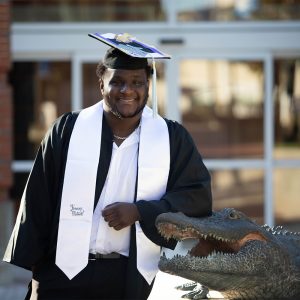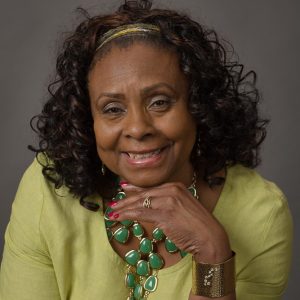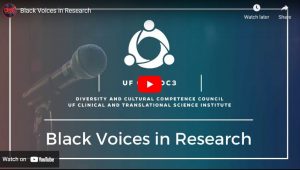Get to Know: Tiffany Pineda
Recently, we sat down with Tiffany Danielle Chisholm Pineda to talk about her incredible journey at UF, some of her accomplishments at work and what inspires her to aim higher.
Pineda is the assistant director for clinical research, IDEA, and chair of the Diversity and Cultural Competence Council at the Clinical and Translational Science Institute, or CTSI.
What has been your career path; how did you arrive at your current position?
I started at the University of Florida on Dec. 19, 1996, as a senior secretary to the chair of the Department of Chemistry, John Eyler, Ph.D. He gave me my first job at UF and consistently encouraged my growth. I was blessed to earn several promotions starting with being a program assistant in the Office of the Assistant Vice President for Health Affairs. Then, I was promoted to the Institutional Review Board, or IRB, under Michael Mahoney. Under his mentorship, I was able to identify and hone my skills and natural passions as an educator.
While there I met H. Robert (Bob) Kolb, R.N., M.S., C.C.R.C., who further assisted me in seeing the impact I could make in the research community as I continued to work at the IRB — including being an IRB-01 board member and a vice-chair designee. I learned how to review, evaluate and assist investigators in developing proposals for studies designed to help improve the standard of care in our hospitals. I learned of a position in the CTSI around the fall of 2015, which would broaden my impact on UF’s research community and allow me to further my educator skills by allowing me to learn how to develop curriculum for adult learners, assess the needs of the research community then apply that to presentations, and increase my repertoire to include new horizons like writing user manuals and foster greater inclusivity, diversity, equity and accessibility in research.
Under the helm of former director, David Nelson, M.D., I was empowered to go beyond the traditional way research education has always been done to develop new ways to make an impact. This included developing several trainings and certificate programs designed to improve equity, ethics and cultural competency in research. A Certificate for Obtaining Consent for Research training, Culture and Consent classes, Mock Consent Class, and the Iceberg in your Research Lab were just a few of the programs I developed. Most of these trainings are a first for UF or have not been done the way I do them.
My role at the CTSI expanded further when Duane A. Mitchell, M.D., Ph.D., took over the directorship. Under his leadership, he allowed me to further expand my wings by funding the first Black Voices in Research Storytelling Event and giving the Diversity and Cultural Competence Council a home and a budget to put our mission in action. I am taking the time to mention some individuals by name because of the meaningful impact they played and some continue to play in my two and a half decades at the University of Florida.
What is the Diversity and Cultural Competence Council and what initiatives have you helped launch as a committee member?
The Diversity and Cultural Competence Council, or DC3, is a committee founded by Bob Kolb, myself and a few other individuals that was established parallel to the appointment of UF’s first Chief Diversity Officer in 2018. The goal of the DC3 is to help UF clinical research professionals become better advocates, allies and accomplices in the intersectional areas of diversity, equity and cultural competence.
To accomplish this, the DC3 convenes to develop unique programming, educational materials and training resources that inspire brave crucial dialogues and help facilitate change at the individual, departmental and institutional level. I’m grateful to be both a founding member of DC3 and its current chair. Our most successful mission to date is our Black Voices in Research storytelling series.
Thus far, we have released two episodes and are in the process of developing a final installment. This finale will serve as a grand conclusion to this project, but not to our commitment of amplifying the voices of our diverse workforce and inspiring greater advocacy, allyship and accountability at UF. As part of this ongoing commitment, DC3 is also recording a podcast titled “the BraveGator Podcast.” The name was chosen by the members of DC3 to reflect the need to elevate from safe conversations to brave conversations, which DC3 believes is necessary to impact change for the better related to meeting our mission.
We are finishing the final episodes and will release them on all platforms. We’ve also created a Canvas curriculum as an extension of our Black Voices in Research storytelling series. The goal of this curriculum is to emphasize how stories can turn into dialogues that foster opportunities for learning and growth as well as inspire action. Through this course, participants can better connect with our storytellers by engaging in meaningful discussions around racial and social injustices in order to contribute to the cultivation of inclusive excellence. DC3 is in the process of officially making another co-founder, Mrs. Gailine McCaslin, a co-chair to recognize her commitment to DC3 and IDEA efforts at UF.
What was the driving force behind the Black Voices in Research event and how has it benefited the CTSI community?
The power of storytelling is universal and its impact has been studied to better validate its potential. I’m Gullah — which has a rich oral tradition — so storytelling has always been important to me and drives my poetry writing and performances. This — in combination with the guidance and support provided by Taylor Williams of Guts and Glory, a local storytelling event company — allowed Black Voices in Research to be born. We wanted to increase the diversity of researchers, research participants and research professionals, and to have another way to bravely tell the stories which had not been heard. To this effect, the series was a new way to tell the stories and importance of these Black researchers and research professionals. Dr. Mitchell, who is now used to my crazy ideas, listened to the pitch for Black Voices and gave us the funding on the spot!

That being said, the impact of this series cannot be overstated. I’ve had testimonials from individuals at multiple institutions and community members as to the positive impact of the Black Voices in Research Storytelling series. The testimonials include knowledge of the importance and impact of telling their own stories, a feeling of community, increased engagements with other institutions, and new diversity and cultural competence initiatives. As a result, we’ve been able to expand our DEI efforts to the institutional level and beyond. The CTSI has continued to support this mission and our growth along the way. Here, DEI is more than just a mission statement, it’s a commitment to learning, culture change and improving equity in both research and its impacts.
CTSI has created an Assistant Director position for Clinical Research, IDEA, and is currently assessing the need for additional IDEA positions. They have also made DEI a presence in actionable ways such as adding me as part of the management team. Because society sees a lot of mission statements but not actions, Drs. Nelson and Mitchell have been intentional about going beyond our mission statement and making DEI an active part of the institute. CTSI has had some brave discussions with staff around DEI and made positive changes to the culture of the institute.
What has been your biggest accomplishment or most memorable experience at UF?

My biggest accomplishment at UF has been my ongoing relationship with the IRB. Peter Iafrate, Pharm.D., and Michael Mahoney still refer investigators and their study teams to me for education and to answer research questions. Regulatory authorities frequently get a bad name but my relationship with the IRB now spans decades and is still friendly. That’s an accomplishment!
My most memorable experience, however, was my oldest son Gregory Baker II graduating from UF on Mother’s Day, 2021. He actually graduated in December 2020 during COVID, so it was a blessing to our family that he was able to finally walk across the stage to receive his bachelor’s degree prior to going to the University of Oklahoma to work on his graduate degree. I’m also a Gator alumni so his graduation made me a Gator Mom!
I’m a Gator alumni, Gator employee, Gator Mom and Gator fan — a Gator to the fourth degree!
What advice would you give your younger self as you prepared to embark on your career path?
I have a journaling practice where I write letters to my future self based on gratitude for my current life. So, if I were to give my younger self advice, I would say all movement isn’t forward. Sometimes you will move left, right and even down not backwards. Focus on being your best self and the end goal. Also, make sure your giggle bucket overflows and be responsible for your emotional and energetic hygiene. And finally, invest in discovering your passion driven purpose and make choices based on that.

What motivates or inspires you?
I am blessed to be the granddaughter of Louise Younge Chisholm Hutchinson, born in 1924, who earned her masters degree and became vice principal of Shell Elementary. I am also the daughter of Elliene S. Chisholm, born in 1946, who also earned her masters degree and became Crown Regional Pre-School Specialist for the State of Florida. She was one of a team of five Regional Pre-School Specialists. I’m stating their years of birth, education levels and accomplishments because they both did things Black women didn’t dare dream of let alone accomplish in America. My maternal lineage of educators and goal smashers inspire me to ignore the labels and limits society may attempt to place on me so I can SOAR. Hopefully, I will inspire and motivate others too.
What hobbies or interests do you have outside of work?
I am an avid reader. Reading three to five books a week! It’s an expensive habit but so worth it. I also have been an African Dancer for decades. The live drums and sense of community are my healing space. The late Patricia Hillard Nunn, Ph.D., a former professor at UF, really fostered my love of African dance and culture. Dr. Hillard Nunn exemplified the epitome of an educator to me and helped me see that I can make a difference.
My most important interest is being the best mother I can be to my children. They are my source of joy and pride and fuel my desire to be my best self.
What advice would you give to someone who just moved to Gainesville?
To a new Gainesville resident, I would say get out and enjoy the city! Gainesville is unique. There are springs, gators — literal and fans — museums, amazing entities like the Actor’s Warehouse and good eats. Look for the places that bring you joy and if there is a gap you find, fill it! Be the change you want to see! There is food here from the Ivory Coast, on Main Street, and many other cultures. Get out and experience it all for yourself — safely, of course!
Do you know someone we should spotlight next? Complete our Campus Spotlight Submission Form!
